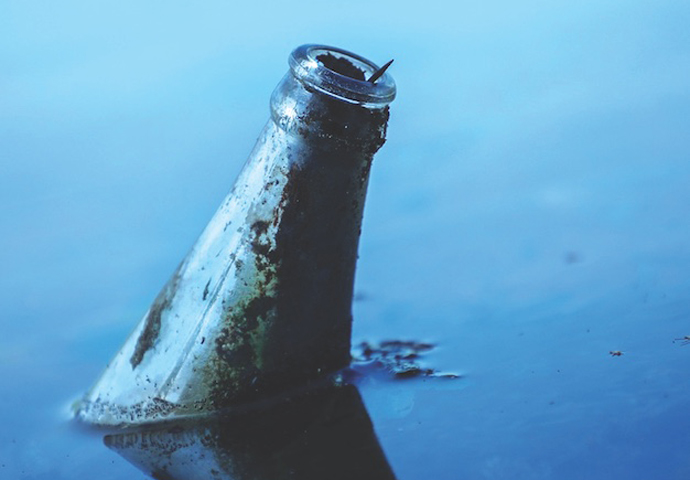Talking rubbish: how the world – and the canal – became our dustbin
A memorable but messy walk by the canal gets Emma Goldman thinking about our attitude to littering our environment
Thursday, 24th April 2025 — By Emma Goldman

[K-K-Martin / Pixabay]
CYCLING canal side from Regent’s Park to Camden, a section of my route to work, it seemed a morning like any other. But that day, the lock gates had been pulled apart to allow for the water to drain.
The canal bed was exposed. It was quite shallow, which I supposed was because narrow boats don’t need depth. Angular shapes stuck out from misty mudflats. The unfamiliarity of the scene caught my attention.
Nothing was moving. Even the air seemed still.
My eyes adjusted.
The largest shape was in fact the metal frame of a double bed, tipped on one side. Half-sunk, the skeleton of a doomed ship. Not far away were two large swivel chairs, oddly upright, missing only a ghostly office worker at his desk. Perhaps slightly more predictably, an upturned shopping trolley lay in a half-shroud of flapping plastic bags.
The bed frame was substantial. I looked back up at the road. The way down here was via rickety steps or a steep, cobbled path. Who on earth had carried it? And the cumbersome chairs? Surely, there were easier places than a canal to dump your rubbish. The corner of one of the plastic bags lifted in the breeze.
I got back on my bike and left, trying to forget the ghostly scene.
The canal is always unpredictable. Sometimes, the willow trees are reflected in it, making you think you’re seeing double. On darker mornings, the sun hangs red on the murky water. Always, the Regent’s Park villas look down over precipitous lawns to the narrowboats.
The following morning, the lock gates were closed and the canal bed vanished. But, as if it had been a murder scene, I couldn’t erase the ruin below the water from my mind. It was another clear morning. The willows reflected, waving their phantom branches from the depths. But all I could picture was that sorry bed at the bottom.
Over the next few days, I became aware, too, of the gathering slough of rubbish at particular points of the canal. The array of wine bottles, beer cans, takeaway boxes. Camden Lock, Kentish Town, anywhere with a wall for a seat or an alcove. Barely any rubbish bins. What was happening to this place of beauty in our city?
I later learned that Camden is responsible for public highway, streets, roads and other areas of land, but the canals don’t fall under its remit. I contacted the Canal and River Trust, who explained that they’d removed bins to “encourage” people to take their litter home.
The verb choice was interesting. I wondered how you were meant to know you were being encouraged to do something if you weren’t actually told. It must require quite a high level of inference or telepathy. After all, no notices explained the absence of bins, or requested the taking home of litter.
I grew up in the Clean Up Britain campaign of the 70s. The advertisements featured a stick figure putting rubbish in a bin with the slogan “Keep Britain Tidy.” On school trips up to London, under the watchful eye of our teachers, we carefully carried the wrappers of our packed lunches over to park bins. The term “litter lout” gained popularity. In our town centre, there was not a speck of rubbish to be seen. Obviously, a bin can’t solve a litter problem but it’s hard to see how, on a canal side, a scarcity of them would have more success.
Back on my bike, I gazed out at the canal, one of the city’s beauty spots and wildlife havens. I pictured the rusting frame below the surface in its watery grave. Perhaps littering simply came down to a disconnect with the world. If office chairs and bedsteads were dumped alongside the side of the street, the council would be swift to act to remove the eyesore. But if something is thrown through a curtain of water, it’s somehow gone and responsibility for it ceases. It’s like the child’s game with mirrors: if something can’t be seen, it isn’t there.
The same “out of sight out of mind” attitude seems to prevail in a number of places. Even in the posher London department stores and pubs, bits of tissue paper lie around on the loo floor instead of being flushed. Office kitchens are often in disarray by evening. Yet it’s unlikely anyone who does these things would do so at home.
As I stared across the water, thinking about this, my gaze fell upon an impish boy not far away. After finishing some sweets, he threw the empty bag on the ground.
I frowned at him.
“Why are you dropping your litter?”
“The world’s my dustbin,” he replied promptly, as if with a well-rehearsed line, and ran away laughing through the cloaking brick of the tunnel.